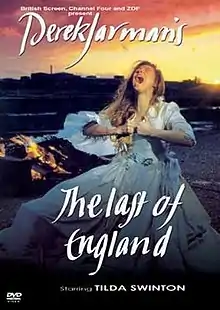The Last of England (film)
The Last of England is a 1987 British arthouse film directed by Derek Jarman and starring Tilda Swinton.
| The Last of England | |
|---|---|
 | |
| Directed by | Derek Jarman |
| Produced by | James Mackay Don Boyd |
| Written by | Derek Jarman |
| Starring | Tilda Swinton Nigel Terry Jonathan Phillips Spencer Leigh Spring - Mark Adley |
| Narrated by | Nigel Terry |
| Music by | Simon Fisher Turner Andy Gill Marianne Faithfull Mayo Thompson Diamanda Galás Barry Adamson |
| Cinematography | Derek Jarman, Christopher Hughes, Richard Heslop, Cerith Wyn Evans |
| Edited by | Derek Jarman, Peter Cartwright, Angus Cook |
Release date |
|
Running time | 87 min. |
| Country | United Kingdom |
| Language | English |
| Budget | GBP£276,000 |
It is a poetic, rather than realistic, depiction of what Jarman felt was the loss of traditional English culture in the 1980s and his anger about Thatcher's England[1] (including the formation of Section 28 Local Government Act[2]), declaring it a homophobic and repressive totalitarian state.[3] In 1986, Jarman was also diagnosed as HIV positive and had just finished his 'masterpiece', Caravaggio, so the film is a confluence of angry imagination.[2] It is named after The Last of England, a painting by Ford Madox Brown. The painting and the film, share themes of escape and the changing of place.[2]
The film uses a shaky hand-held camera to evoke anxiety and paranoia, and the ever-present melancholy is expressed in the extracts from poems, including T.S. Eliot's The Hollow Men and Allen Ginsberg's "Howl", which are monotonously read by narrator Nigel Terry.[3]
One of the film's most famous scenes is of Tilda Swinton, dressed not unlike the woman from Brown's painting, as a bride mourning her executed husband,[3] screaming and letting out a primal cry whilst rubbish burns around her. The scene was shot near the director's home on the beach of Dungeness, Kent.[2]
Other images in the film, are counterpointed by Bach violin sonatas and 1980s disco. Skulls, fire and ashes embody death and destruction, while scenes of sex on a Union Jack flag and 'Spring' masturbating show a disregard for social conventions and suggest a country in a state of chaos and sordid decadence.[3]
Cast
- Tilda Swinton as The Maid
- Spencer Leigh as Soldier / Various roles
- 'Spring' Mark Adley as Spring / Various roles
- Gerrard McArthur as Various roles
- Jonny Phillips (credited as Jonathan Phillips) as Various roles
- Gay Gaynor as Various roles
- Matthew Hawkins as Junkyard Guy
- Nigel Terry as Narrator (voice)
Awards
Derek Jarman received the 1988 Teddy Award in Berlin for the film. Also Tilda Swinton received the jury prize for her performance in the film.[4]
Reviews
On Rotten Tomatoes, it has an average score of 68%, based on 3 reviews.[5]
'What proof do you need the world's curling up like an autumn leaf?' is Time Out magazine's review.[6]
"Terrible" is David Bezanson's review, "Impressionistic" doesn't have to mean "bad" and "It's graphic and disorienting, yet also totally trite".[1]
Book
Jarman wrote a book to accompany the film,[7] which deals more explicitly with the relationship he had with his father, who was a Lancaster bomber pilot in the Second World War. Jarman used the impact of his father's despair, depression and violence on his own artistic vision. The depression that his father suffered is attributed to the high number of fatalities that bomber crews experienced and the carpet-bombing of civilians.
The book and to a lesser extent the film are very much in the tradition of Roland Barthes Camera Lucida, Susan Sontag's On Photography, Jeanette Winterson's Art Objects and to a lesser extent John Berger's Ways of Seeing in that he has used the deeply familiar and personal as a vehicle for dialogue about art and contemporary culture.
Soundtrack album
Two versions of the soundtrack album were released on the Mute Records label. The LP has one side ("Bombers") by Simon Turner, and the other ("Diplomat") by a variety of performers, including Mayo Thompson with Albert Oehlen and Tilda Swinton; Andy Gill with Dean Garcia, Barry Adamson and Martin Micarrick, Brian Gulland and Diamanda Galas. The CD version includes all of this material and a third section, "Dead to the World", primarily by Turner.
References
- Bezanson, David. "The Last of England Review". contactmusic.net. Retrieved 14 August 2018.
- Scovell, Adam (7 November 2014). "In Profile: Derek Jarman's The Last of England (1988)". thedoublenegative.co.uk. Retrieved 14 August 2018.
- Kuc, Kamila. "Last of England, The (1987)". screenonline.org.uk. Retrieved 14 August 2018.
- Rose, Toby (6 February 2015). "Berlin Film Festival: why the Teddy Awards ceremony is one of the wildest parties on the festival circuit". The Evening Standard. Retrieved 14 August 2018.
- "THE LAST OF ENGLAND (1987)". rottentomatoes.com. Retrieved 13 August 2018.
- "The Last of England". timeout.com. Retrieved 14 August 2018.
- Jarman, Derek; Hirst, David L. (1 January 1987). The Last of England. Constable & Robinson. ISBN 0094680809.